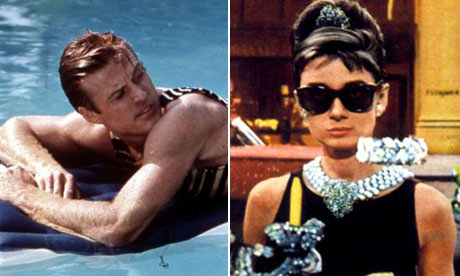
"So we beat on, boats against the current, borne back ceaselessly into the past." F Scott Fitzgerald, The Great Gatsby
"I am always drawn back to places where I have lived, the houses and their neighbourhoods." Truman Capote, Breakfast at Tiffany's
The closing sentence of one classic of American literature and the opening sentence of another, both reflecting upon the inevitable pull of the past. Sarah Churchwell's recent article on Breakfast at Tiffany's drew comparisons between these two works' shared themes of "escape and reinvention". But while I agree with this, I'm going to venture one step further and suggest that Breakfast at Tiffany's can be read as an actual re-write of The Great Gatsby. As well as these common themes there are a number of structural similarities that suggest Capote used Fitzgerald's novel as a model for his novella.
To start with, let's take a look at the similarities between Jay Gatsby and Holly Golightly. Attractive, charismatic and enigmatic? Check. Connection with organised crime? Check. Penchant for hosting parties and affected speech inflections (old sport/darling)? Check/check. Cessation of said parties once romance blossoms? Check. Humble origins, changes of identity, driven by dreams and ideals leading ultimately to death and exile? Check, check, check, check.
Then there are the technical similarities between the two novels. Gatsby and Holly are both subjects of first-person narratives, the narrators being (let's be brutally honest here) a pair of non-entities living vicariously through the lives of their more glamorous neighbours. Nick Carraway and the unnamed narrator of B@T (who for ease of reference I'm going to follow Holly's example and call Fred) are new arrivals to New York, their outsider status described using strikingly similar imagery. From The Great Gatsby we have arguably the most beautiful passage in a novel brimming with beautiful passages:
"At the enchanted metropolitan twilight I felt a haunting loneliness sometimes, and felt it in others – poor young clerks who loitered in front of windows waiting until it was time for a solitary restaurant dinner – young clerks in the dusk, wasting the most poignant moments of night and life."
Holly's summation of Fred is a little more succinct:
"He wants awfully to be on the inside staring out: anybody with their nose pressed against the glass is liable to look stupid."
Admittedly, nose-against-the-glass imagery isn't exactly original, so this could be purely coincidental – but these are both slim texts remember, collectively under 300 pages. And how about the boasts made about their protégées by Gatsby's and Holly's respective benefactors, Meyer Wolfshiem and OJ Berman:
"'Start him? I made him … I raised him out of nothing, right out of the gutter. I saw right away he was a fine-appearing gentlemanly young man.'"
"I'm the guy giving her the push … OJ Berman … I'm the first one saw her … I'm interested: professionally ... the kid's fifteen. But stylish: she's okay, she comes across."
Or the vocal tics of a couple of secondary characters?
"I've heard it said that Daisy's murmur was only to make people lean toward her.""Even the stutter, certainly genuine but still a bit laid on, had been turned to advantages … it contrived to make banalities sound somehow original..."
Descriptions of autumn?
"Life starts all over again when it gets crisp in the fall"
"Aprils have never meant much to me, autumn seems that season of beginning, Spring."
And there's more: events in both books come to a head on the narrators' birthdays, triggered by a car crash in GG and a runaway horse in B@T (Nick is later described as a "bad driver", Fred as "bad jockey".) Both protagonists are visited by a person from their secret past whom they have outgrown and left behind (Gatsby posthumously by his father, Holly by her estranged husband.) After the death of Gatsby, it is left to Nick to phone round and organise his funeral ("it grew upon me that I was responsible, because no one else was interested".) When Holly is jailed it is left to Fred to phone round and organise her bail ("What other friends of hers did I know? Perhaps she'd been right when she said she had none, not really.")
But I come to praise Capote, not to bury him. I think it's a brilliant display of chutzpah that he fashioned a classic work of American literature out of another. Then again, maybe I'm just romanticising an act of bare-faced plagiarism, stating the Bleedin' Obvious, or totally misinterpreting the text, Charles Kinbote-style. Any thoughts? And are there any other Great (or Not So Great) Works of Literature hiding under the beard of another? If I am right, then, to paraphrase Capote himself, I just hope he was grateful that Fitzgerald was able to be of some small service to him...

